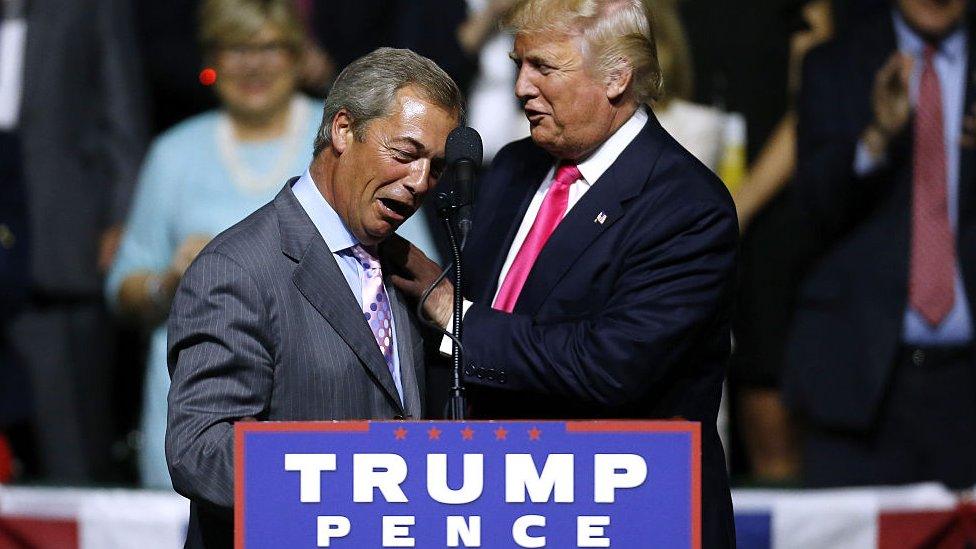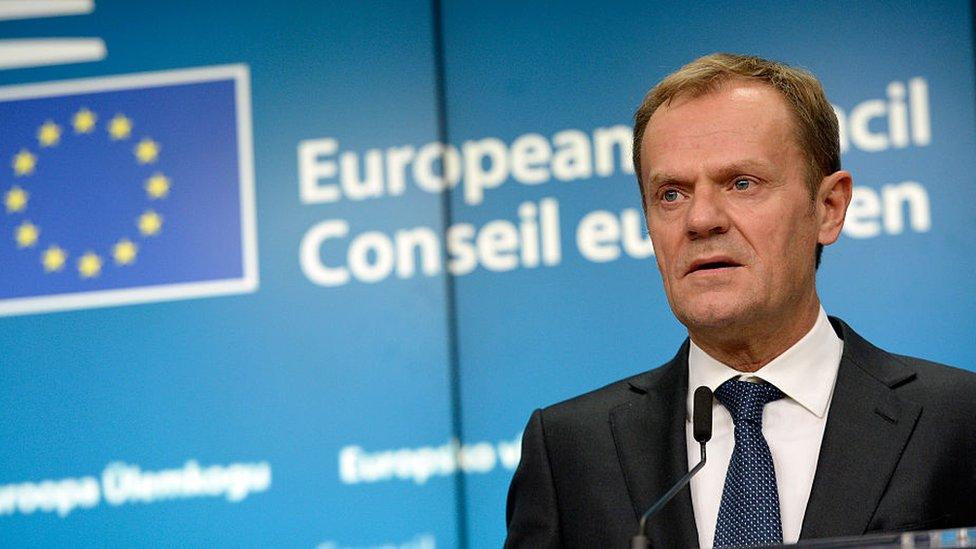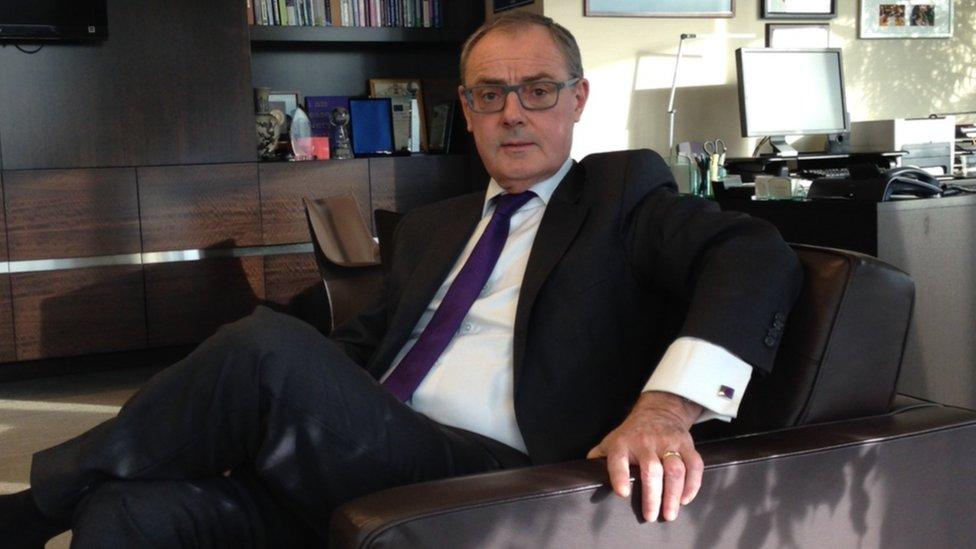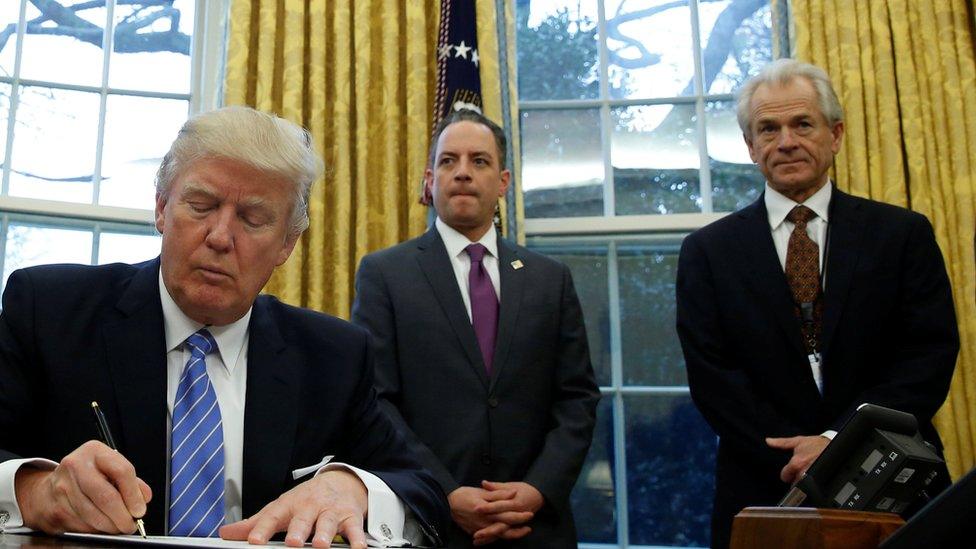European diplomats in uncharted terrain in US
- Published

European diplomats in Washington are relying on "strategic patience" while they try to chart a new course with the White House.
David O'Sullivan, the European Union's ambassador to the US, spoke recently at a reception at his house.
His new neighbours, the Obamas, had just moved in and not far was the home where Ivanka Trump and her husband, Jared Kushner, a senior adviser to the president, were now living.
"Kushner to the left of me, Obamas to the right," he said, doing a playful remix of a Gerry Rafferty song. "And I'm stuck in the middle of the EU."
His words struck a chord for those in the living room, a group of ambassadors, academics and others personally invested in a strong relationship between the European Union and the United States. The relationship is built on a shared belief in the importance of European integration, a project that is decades old.
The latest iteration of the EU was established with a treaty signed in Maastricht, the Netherlands, on 7 February 1992. The anniversary is being celebrated this week in Maastricht, external, New York, external and other cities.
For the US, the European Union has provided a forum for a unified approach towards global issues. Its leaders have worked closely with US officials on matters such as trade, counterterrorism and sanctions against Russia.
Now European officials are trying to come to terms with the new administration and its hostile-ish approach towards the EU - and are wondering how the relationship between Washington and Brussels will evolve in this environment.
These Europeans face a difficult challenge, They are attempting to persuade those who are now in power in Washington that the EU is more than just an economic bloc or a way to negotiate deals.
The European officials - and those who believe in the European integration project - believe that the EU is a powerful force that binds nations together economically and politically and in this way helps them to prevent another world war from breaking out.
"We in Europe have made so much progress since the dark days of 1945," O'Sullivan said, emphasising the importance of the European Union in keeping the peace.

EU council President Donald Tusk has said the Trump presidency means a "difficult situation" for Europe
Mr Trump has been ambivalent towards Europe. He praised the decision of Britons to leave the EU and said in an interview, external that he believes more of its members will follow suit. "Countries want their own identity," he said.
On Monday he said that he supported Nato, despite attacking them in the past. But he said that its members needed to increase the contributions they are making to the alliance. (Most of the members don't meet guidelines that state their defence expenditures should amount to 2% of their nation's gross domestic product.)
His harsh stance towards Nato and the EU has troubled European officials.
Nigel Farage, the former leader of the UK Independence party who campaigned with Mr Trump has described, external - with some glee - the Europeans as "terrified" of the Trump presidency.
Mr O'Sullivan and the other Europeans might not be terrified. But they're watching the situation closely - and seem worried. Donald Tusk, the president of the European Council, expressed their apprehension in a letter, external to EU leaders.

David O'Sullivan must thread the needle of EU-US relations in a new administration
Mr Tusk described "a difficult situation, with the new administration seeming to put into question the last 70 years of American foreign policy".
Not everyone has been sympathetic to the plight of Europeans. For some, Tusk's letter was the kind of thing they'd come to expect from European officials.
"I don't think it's going to make the EU any more popular than they already are, which is not very," said Ted Bromund, a Heritage Foundation senior research fellow who consulted with Trump officials during the post-election transition.
Like many of the administration officials, he thinks the EU should be smaller. Others in the US disagree. Stanford University's Larry Diamond has been surprised by the administration's "sympathy" for eurosceptic political parties.
"If enough of these parties win, that will be end of the EU," Diamond said. For him, that would be unfortunate, saying that the EU was founded on liberal principles or as he put it "basic truths that I thought we'd understood for decades".
Meanwhile O'Sullivan has been taking meetings and phone calls in his Washington office, trying to maintain a sense of calm. He and other European officials have told me that they don't know yet how they'll work with the US on trade and sanctions against Russia - or whether the US officials will implement new policies.

What will the Trump administration mean to Europe?
But O'Sullivan said he was confident about their overall relationship with the White House officials and emphasised the strength of ties between the US and Europe. "The new administration recognises the importance of traditional friendships," he said.
He seemed surprised to hear the criticism of Tusk's letter, saying that Tusk was not being "unfriendly".
O'Sullivan got up from his chair and went to retrieve a copy of the letter from his desk. A map of 18th-century Europe hung on a nearby wall, and a copy of Carlo Bastasin's Saving Europe: Anatomy of a Dream was lying on a table.
An Irishman, O'Sullivan studied at the College of Europe in Bruges and speaks five languages (including Irish). In his office decor and manner, he is European - he was wearing a dark suit, a fashionably narrow tie and cufflinks.
He rubbed his nose and read passages from the letter aloud, waving his hand in the air as if he were a conductor.
Looking up, O'Sullivan said that Tusk was describing a future that is "highly unpredictable", saying this was "exactly what President Trump said we're going to have - a new America".
The new relationship would be different from the one they had in the past, he said, but he was confident that the fundamental nature of the relationship between Brussels and Washington would remain unchanged.
"I'm sure they're doing to see the business logic," he said, adding that he was guided by words familiar to students of philosophy: "Optimism is a moral duty."
Follow @Tara_Mckelvey